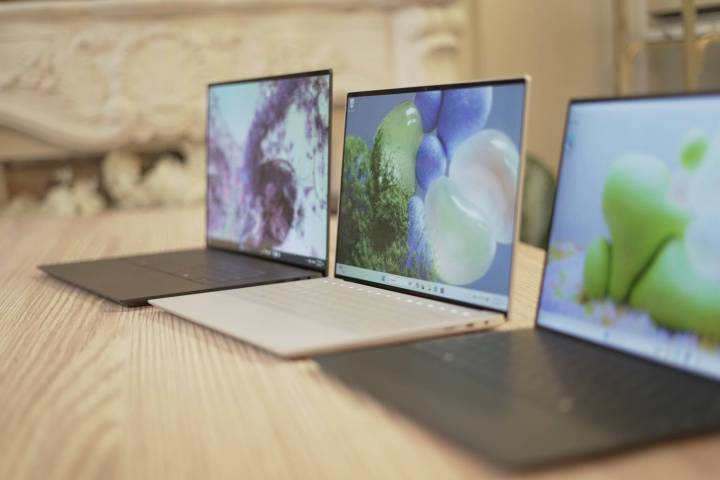
There’s been a lot of talk about why PCs are about to make a comeback this year. Will it be AI that will boost PC sales? What about a big update to Windows?
Maybe, maybe not.
All I know is there are some exciting laptops that get me pumped to be a reviewer this year. From daring experiments to game-changing new technology, these are my most anticipated new laptops of 2024, some of which are destined to be among the best laptops you’ll be able to buy.
Dell XPS 14
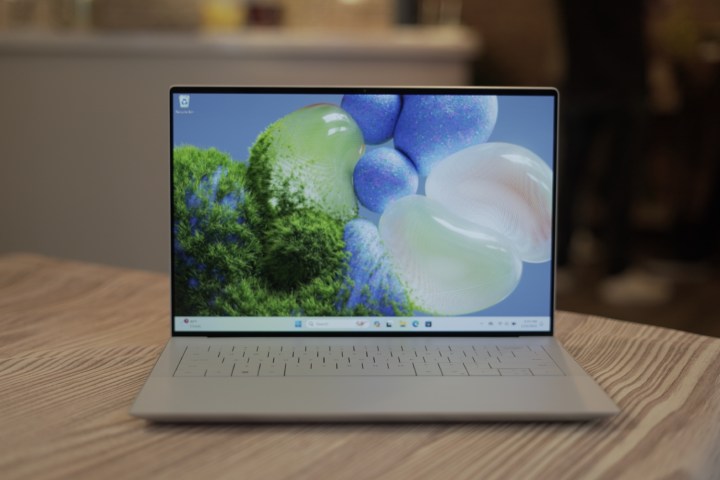
The XPS brand has earned a reputation for pushing the boundaries of minimalism, starting with the ultra-thin bezels it pioneered many years ago. But this year’s major revamp of the XPS lineup has come with a healthy dose of skepticism. And maybe some mockery.
In particular, everyone is upset about the seamless haptic trackpad and the capacitive touch buttons, both features borrowed from the XPS 13 Plus. Add in the lack of ports and expandability, and it’s not hard to see why there’s a backlash against this design.
But on the other hand, I’d be lying if I said the look of this laptop isn’t striking. I’ve seen it in person, and it’s high on the list of laptops I can’t wait to spend more time with.
I’m saying the XPS 14 specifically because I still think the XPS 16 feels like a non-starter as a larger content-creation device. When it comes to the 14-inch model, though, I can be more forgiving of some of those design changes, especially since we’re getting a faster 120Hz screen and a considerably smaller chassis compared to the XPS 15. More than anything, I’m curious about its performance once you configure it with the RTX 4050. Feels like a decent MacBook Pro 14 competitor to me.
MacBook Air M3
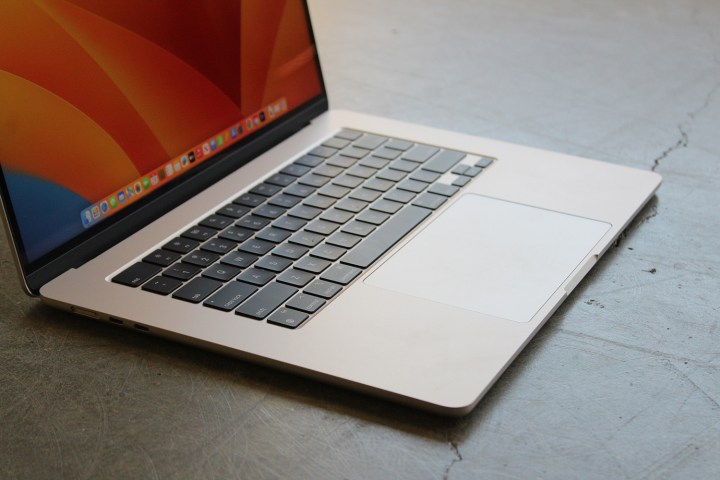
This is going to be a relatively quiet year for MacBooks. However, the one update we know is coming is the M3 update to the MacBook Airs. The info comes from Apple insider Mark Gurman, who says the M3 MacBook Air will be launched at a spring event alongside some updated iPads.
In lieu of releasing the M3 update last fall, it looks like Apple will be lining up an M3 update to the 13-inch and 15-inch MacBook Air at the same time. It’s also expected that the M1 MacBook Air will finally be officially cut from the lineup, leaving Apple with a simpler lineup unless Apple does something like continuing to sell the M2 MacBook Air. We’ll have to see, but this will likely be the only MacBook launch of the year. That’s because Gurman says the launch of the M4 (and MacBook Pros) is being saved for 2025, which will be built on 2nm TSMC chips.
These M3 MacBook Airs won’t have much else in terms of design changes. After all, the 15-inch model came out just last summer. Graphics will be the biggest update to these devices, but if you’re coming from an aging M1 MacBook Air that’s a few years old, it might make for a decent upgrade.
Asus ROG Zephyrus G14
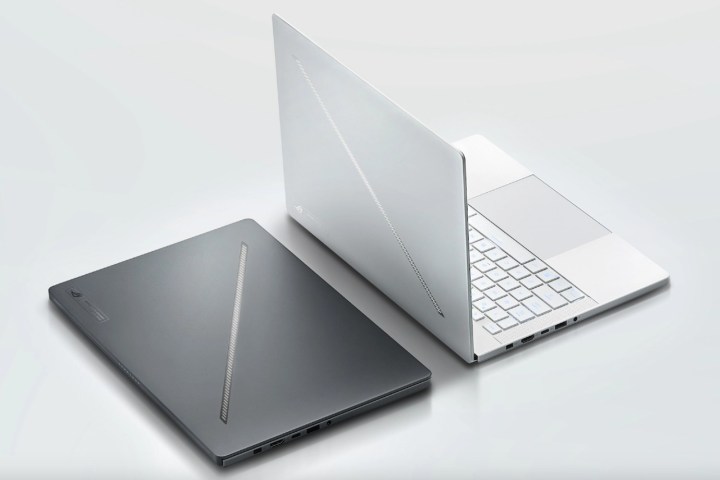
Next up is my most anticipated gaming laptop of the year, and the one Windows laptop that I think is the most competitive with something like a 14-inch M3 Max MacBook Pro. It’s gotten a complete redesign this year, with a clear eye to make this more of a crossover laptop than it already was – and by that, I mean a laptop that looks like a mainstream consumer device that just so happens to be a powerful gaming laptop. It’s being sold for creativity and productivity just as much as for gaming. And I, for one, totally buy it.
It still has the flashes of ROG gaming style, whether that’s the new “slash” bar of light on the lid or even just the font on the keycaps – but now, you’re also getting a thinner chassis that’s very close to as thin as and is actually lighter than the 14-inch MacBook Pro. It also has a widened touchpad that looks fantastic, larger keycaps, and a brighter white color option. We saw it in person at CES this year, and it looks gorgeous.
It’s not just style changes, though; it also has options for a 500-nit 120Hz display and an RTX 4070 with a 90-watt TGP. The same update is being applied to the large 16-inch model, too, which has options for a 240Hz display and up to an RTX 4090. Obviously, all this needs to be tested, but this is definitely one of the laptops we’re most excited to review when it comes out later this year.
Surface Pro 10 and Surface Laptop 6
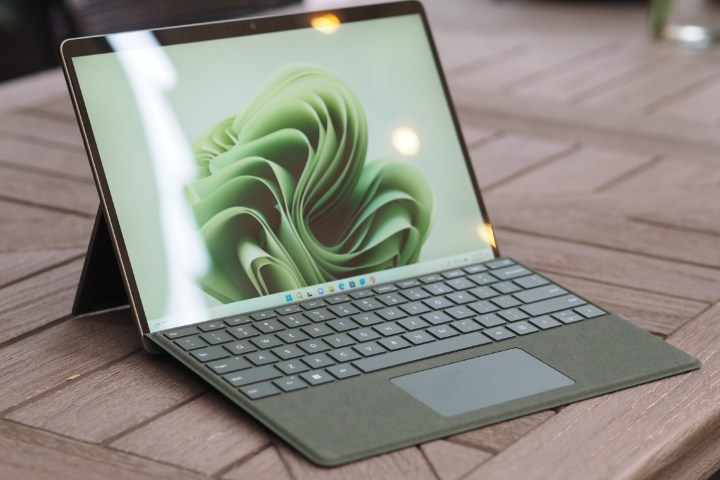
Then we have a pair of devices that have been a long time coming. The Surface Pro 9 came out in October of 2022, so it’s been a while since we’ve heard anything about Microsoft’s flagship 2-in-1. To be fair, they did lose the head of Surface and Windows Panos Panay just last fall.
However, the recent report from Windows Central points to two releases coming for both the Surface Pro and Surface Laptop. First is a more conventional commercial launch in the spring, presumably named the Surface Pro 9+ and Surface Laptop 5+.
But the real exciting stuff will supposedly come in the late spring or early summer with the Surface Pro 10 and Surface Laptop 6, and even though we’re not expecting radical new designs, we do know that they’ll be lined up with both the launch of a new AI-focused Windows update, maybe called Windows 12 (or maybe not), as well as the launch pad for the new ARM-based Qualcomm chips — and guys, this is where things get really interesting.
These Snapdragon X Elite chips may end up being a huge deal, and the rumor now is that they will be the exclusive chip options for both the Surface Pro 10 and Surface Laptop 6, aiming to match the performance and battery life of modern MacBooks. In fact, Qualcomm stated its chips are 21% faster than the M3, and I know those claims are still just that: claims. But it’s enough to get me excited.
Taking a step back, this could end up being Microsoft’s big ARM transition moment, just like Apple had in 2020. It’ll never be as complete as Apple’s, but if the Surface Pro 10 launch is backed up by support on the app ecosystem side of things, it could be huge. We’ve seen some positive changes recently already. We already know that almost every laptop manufacturer is on board, too, including Dell, Lenovo, HP, Asus, and Samsung, but it’s feeling like these two new Surface devices could be the ones to kick things off.
Lenovo ThinkBook Plus Hybrid
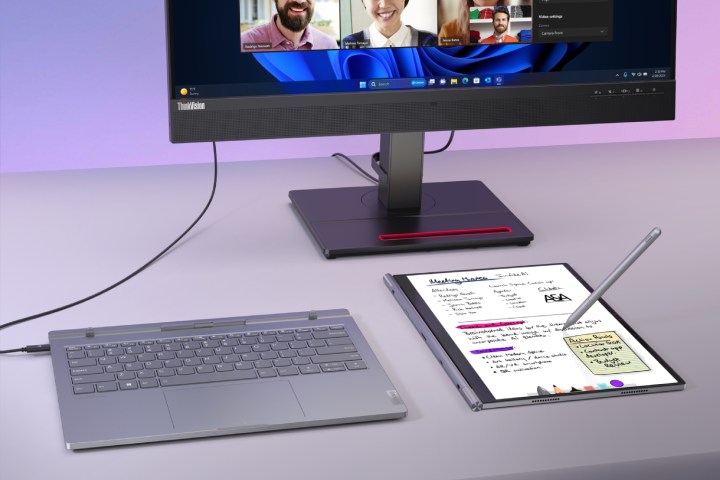
Lastly, I want to end with one more I saw at CES that excited me enough that we gave this a Best of CES award, and that’s the Lenovo ThinkBook Plus Gen 5 Hybrid. This was a 2-in-1 with a very unique premise. On one level, it’s a Lenovo Windows laptop like any other.
But yank up on the screen, and you can pull off the 14-inch screen to be used as a tablet, not unlike the Surface Book devices from back in the day. The difference here is that this tablet has a full version of Android 13 running on it. The benefit, of course, is that Android is a much more intuitive touch-only operating system than Windows 11 and has a large ecosystem of Android apps — again, at least compared to Windows.
Beyond that, it had a few neat tricks up its sleeve, such as sharing files between the two systems, running Android in a window, and even running it as an Android laptop. There’s a lot I want to test with this unique device, but of all the more experimental designs to be announced this year so far, this one feels the most functionally practical. This is one I could actually see myself loving to use.
Editors’ Recommendations

